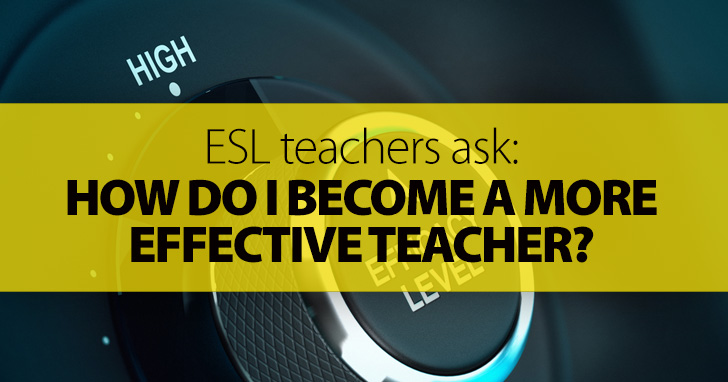“Sometimes I feel my students could be learning a lot faster. They would accomplish a lot more if only I could guide them better towards increased English fluency. What can I do to become a more effective teacher?” *
Effectiveness is the capability of producing a desired result. As ESL teachers, what result can we hope to obtain? Naturally, we want our students to feel more confident when speaking English. We want them to speak better, to speak more. We want them to learn to communicate effectively in English. So, what does it take to produce this result? What does it take to truly be an effective teacher? Let’s find out!

Defining “Effectiveness” When Teaching ESL
If “effectiveness” is the capability of producing a desired result, what does “teaching effectiveness” involve? Firstly, effective ESL teachers motivate and stimulate ESL learners. Highly effective teachers may even get students really excited about learning and thoroughly engaged in class activities. Effective ESL teachers also guide students towards acquiring the language, tools and strategies they need for good communication. But they also encourage learner autonomy. Effective ESL teachers understand that the end goal is for ESL learners to go out into the real world and communicate with real people, on their own. Now, let’s see different ways to become a more effective teacher.

Check These 10 Ways to Become a More Effective Teacher
-
1
Put the Students (and Their Goals) First
Don’t focus on “teaching the book” or “completing the course”. The coursebook is an accessory, a tool that helps give your course a structure, a backbone. Focus instead on guiding your students towards increased language proficiency, step by step, with specific goals for each step of the way.
-
2
Know When to Speak (and When to Shut Up)
Sometimes, ESL students don’t speak because we don’t give them the opportunity to speak. Don’t finish their sentences. Don’t interrupt them with immediate corrections. Don’t provide the answer when they’re taking too long. Hold your breath. Resist the urge. Wait. See what they can come up with on their own.
-
3
Offer Praise
ESL students are sometimes very sensitive to corrections and criticism. Let’s not lose sight of the fact that self-confidence is essential to good communication. If you correct them too much you risk shattering their fragile self-confidence (“I can't speak English! My English is horrible!”), and you don’t want to do that. So, offer praise, whenever you can, for a great example, a word they’re using correctly or a complicated question they managed to answer. ESL students need our encouragement as much as they need our corrections.
-
4
Be Consistent
If you say there are consequences for breaking the classroom rules, you’d better follow through on those consequences. If you say you will have the tests corrected by Friday, you’d better deliver. Do what you say you will do. Your students will respect you a whole lot more for it.
-
5
Use Variety
Out in the real English-speaking world, ESL students are faced with variety: a variety of accents; a variety of communication tools; a variety of settings and circumstances. The effective ESL teacher prevents students from getting accustomed to a particular way of doing things so they have the flexibility to adapt to different scenarios. Moreover, adding variety helps keep things interesting.
-
6
Show, Don’t Tell
Effective ESL teachers don’t teach a new topic by “explaining” how it works. Instead, they give examples and guide students towards comprehension; they help them come up with answers on their own.
-
7
Teach in Context
Does it make sense to give students a list of irregular verbs and their past forms, and start practicing from there? What’s the setting? What’s the context? Effective ESL teachers don’t copy down lists of verbs or words to memorize or study. They help students place themselves in a real life setting, a scenario that will help them see how to use the language: You see your friend again on the first day of class and you want to tell him/her about your holidays.
-
8
Be Prepared
Do you have all of the materials, worksheets, photocopies and flashcards you need for class? Do you have them ready days before class and not at the last minute? Do you prepare lesson plans well in advance? Do you have a Plan B in case something doesn’t work out? Effective teachers know how to plan effectively so they are not overwhelmed by last minute preparations.
-
9
Set Clear Goals
Students are aware of the overall goal – they know full well why they’re taking the course (communicate in English better). But seeing the big picture does not necessarily help them move forward. They move forward in a series of smaller steps, and these are the very same steps you need to outline for them (Step 1: Talk about yourself; Step 2: Talk about your family/what you do for a living; etc…).
-
q
Cater to a Variety of Learning Styles
Some students are more visual; others are clearly musical learners. If you plan activities that predominantly cater to one type, then you won’t be reaching learners with other learning styles effectively.
Above all, be sure to create an environment that is conducive to effective learning.
Keep you lessons upbeat and positive. Emphasize the importance of treating each other with respect. What could be more effective than that?
* This question was sent in from a real ESL teacher, just like you! If you need any advice on a particular topic, share your question in the comments below. Or tweet your question to @busyteacher_org with the hashtag #ESLTeachersAsk. Your question might get picked and featured in an article!
P.S. If you enjoyed this article, please help spread it by clicking one of those sharing buttons below. And if you are interested in more, you should follow our Facebook page where we share more about creative, non-boring ways to teach English.







